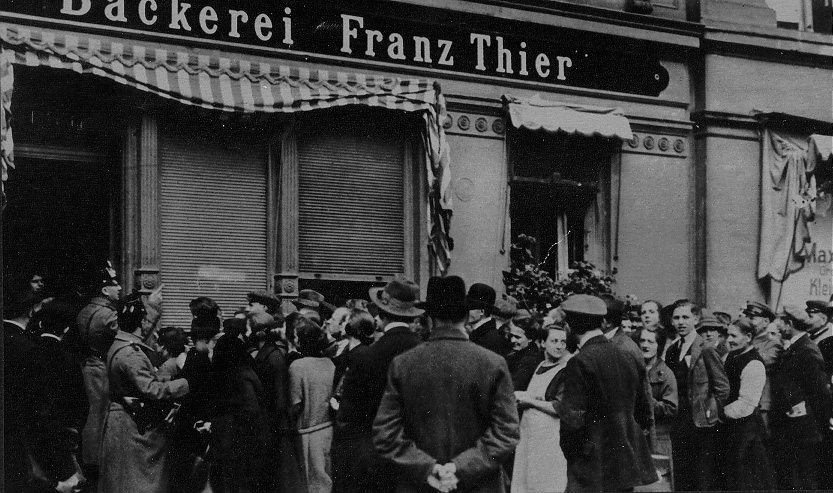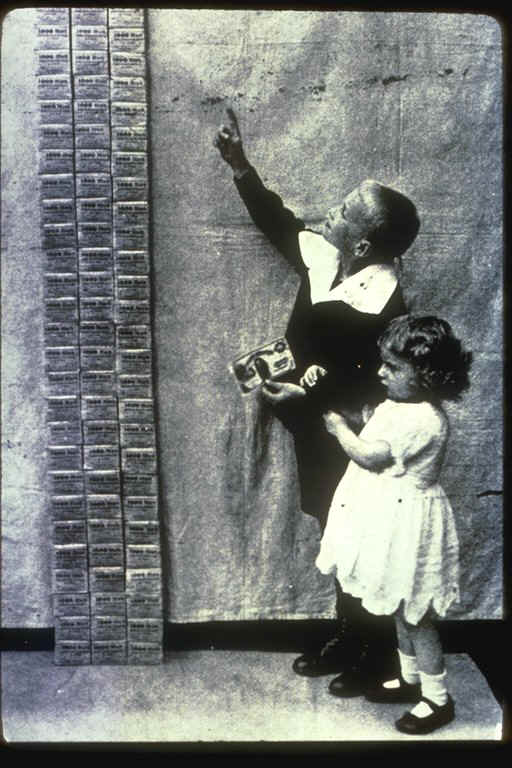German Economy in the 1920s
By Daniel Castillo (author page), Dec. 2003
There were several characteristics which Germany possessed after the First World War which made them vulnerable to being manipulated by someone like Adolf Hitler. As in most nations, the economic factors of the time play a significant role in determining how a society will behave. Germany was economically devastated after a draining defeat in World War I. Due to the Versailles treaty, Germany was forced to pay incredibly sizeable reparations to France and Great Britain. In addition, the Versailles treaty, which many agreed was far too harsh, forced Germany to give up thirteen percent of its land.
 |
| Lines would build up filled with people who wanted to buy the few items left in stores (source) |
 |
| Stacks of German Marks, which were practically worthless due to super inflation (source) |
At first Germany tried to recover from the war by way of social spending. Germany began creating transportation projects, modernization of power plants and gas works. These were all used to battle the increasing unemployment rate. Social spending was rising at an unbelievable rate. In 1913 the government was spending approximately 20.5 per resident; by 1925 it had risen to almost 65 marks per resident and finally in 1929 it reached over one hundred marks per resident. The elevating amounts of money which were used for social spending combined with plummeting revenues caused continuing deficits. Eventually the municipal finance collapsed in 1930. Although it seemed as if the collapse was due to debt, in actuality ordinary budgets were the reason for the initial collapse. Municipal officials and politicians were unable to restore order to the budgets. Further adding to Germany's economic problems, the revenue from income tax began to fall. In 1913, over fifty three percent of all tax revenues was from income, but in 1925, it dropped down to 28%. As the returns on income taxes decreased, the government began to depend much more on state trade and property tax. The government also became highly dependent on the profits made from municipal utilities, such as electric power plants.
Even with all of Germany's economic shortcomings, it could have still been possible to make reparation payments if foreign countries had not placed protective tariffs on Germany's goods. With the income Germany could have gained by selling goods in foreign countries, for relatively low prices, reparation payments could have become feasible. The protective tariffs made this idea impossible and further depressed the German economy. Faced with reparation payments they could not afford, Germany began printing exaggerated amounts of money. This threw Germany into a state of super inflation. Inflation reached the point where millions of marks were worthless. Cartoons of the time depicted people with wheelbarrows full of money who could not buy a loaf of bread. "With the approach of world crisis foreign lenders withdrew capital and markets further closed against German imports" (Sweezy 8). The United States was an extremely significant example of this. When the U.S. was hit by the great depression they immediately sought to get the loans, which they had made to German, paid back. This, in addition to all of Germany's other problems, practically caused the German economy to collapse.
With Germany at its weakest and most vulnerable point, Hitler took the opportunity to begin his ascent to power. Even to this date, in a country as diverse and liberally minded as the United States, when the economy is down people desire somewhere to place the blame. For example, the current use of illegal immigrants from Mexico as scapegoats for economic hardships. In Germany, Hitler used the Jewish people as a scapegoat for all of Germany's problems. With disproportional numbers of wealthy Jewish business owners, Hitler convinced much of Germany that the Jews were to blame for the poor economic state.
Hitler had two significant ideas that helped launch him in to power. He had someone to blame for the economy and he had a plan for a swift economic recovery. Hitler outlined a plan where in four years he would completely eliminate unemployment throughout Germany. Even though his plan was a plan that would not raise the level of income for the enrichment of the people but an economic plan for military strength and victory the German people were eager to see any economic success. Hitler used an extremely detail and well-organized plan for economic revitalization. Through his method, Hitler was able to keep his promise of economic growth and begin his climb to power.